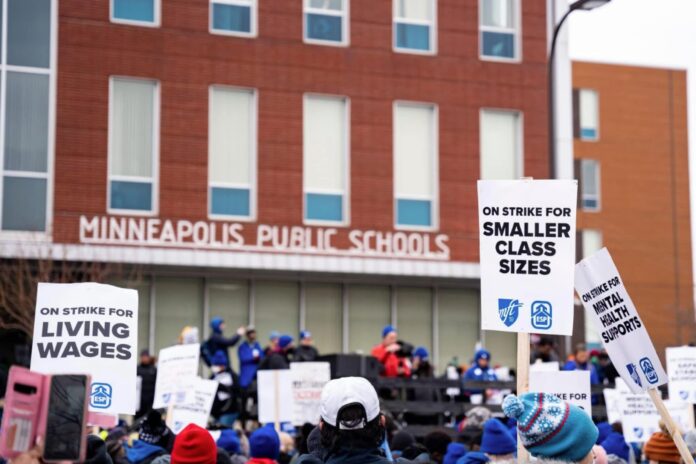
(Opportunity for All Kids) — Talks between school districts and teachers unions are under way in many Minnesota cities, not the least of which are Minneapolis and St. Paul. Teachers in the latter district just voted on Feb. 15 to strike. Minneapolis teachers, meanwhile, highlighted the pay differences between their district and St. Paul earlier this month.
“Union leaders confirmed an average MPS teacher’s salary is about $75,000, compared to $86,000 or more in St. Paul,” Fox 9 reported. “Minneapolis teachers want an 8.5% salary increase in the first year and 7.5% in the second.”
In other words, Minneapolis teachers just want fair and equitable pay.
But even while these teachers demanding equitable pay are getting front and center attention, there’s another inequity taking place in these same districts to which no one seems to be paying attention. That issue, according to education advocate Denisha Allen, is school choice for Black families.
“As a Black American whose life was changed by school choice,” Allen writes in an article for The Hill, “there is no more central issue to the modern civil rights movement than education.”
Allen continues:
“Our American education system is unfortunately defined by disparities based on race and economic status. Our public schools trap children in a one-size-fits-all system that is not designed to recognize individuals’ needs, often leaving behind those who struggle to overcome these racial and economic disparities. And that’s a feature of the system, not a bug. Public schools were once among the primary mechanisms of segregation, used as tools to stifle Black minds and curb Black success.
Today’s public school system is a product of its earlier iterations. Far from offering Black Americans an equal right to learn, it stifles their minds and blocks their success. It fails to nourish pupils and creates an entire class of undereducated Black students, perpetuating the cycle of systemic racism.”
Her words are right on point when it comes to St. Paul and Minneapolis. As the charts below from the Minnesota Department of Education show, only 9.9% of Black students in St. Paul Public Schools are proficient in math, while 16.5% of them are proficient in reading. Things only get worse as we cross the river to Minneapolis, where only 8% of Black students are proficient in math and 14.5% are proficient in reading.
There’s no other way to look at it. These districts are failing Black students and setting them up for failure.




School choice can change this dismal landscape, Allen writes. “Give Black families the ability to select an education that is right for their children, and you dramatically shift the playing field, offering Black students an unprecedented opportunity to obtain a quality education, customized to their needs and focused on their success.”
Last summer, I sat in a Minneapolis park chatting with a Black single mom friend of mine about her children’s education. She loves her children, wants the best for them, and prays to see them succeed. Yet her unhappiness with the public school systems her children have attended over the years was evident. When I asked her if she’d be interested in sending her children to a certain private school in the city with the help of a school choice program such as an Education Savings Account (ESA), she practically shouted, “YES!”
She’s not alone. “Fully 73 percent of Black American voters support school choice,” Allen writes.
Yet instead of helping these Black families succeed by offering school choice, we ignore their plight — and even cause it to potentially worsen as teachers threaten to walk out of school and leave these children without instruction for days on end.
“It is time to place the well-being of our children above the agendas of special interests,” Allen says. Do you agree?
















